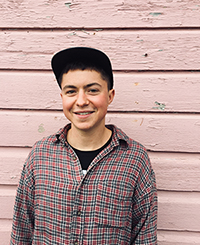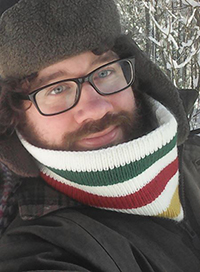Last Chance to Submit!
Autumn Issue Interview with Kai Conradi on Fiction
 Malahat volunteer Kara Stanton talks with Kai Conradi about the aliveness of desert landscapes, the importance of alone time, and the influence of Lander, Wyoming on his story "Every True Artist." Malahat volunteer Kara Stanton talks with Kai Conradi about the aliveness of desert landscapes, the importance of alone time, and the influence of Lander, Wyoming on his story "Every True Artist."
KS: The story presents many different types of portraiture—and failures of portraiture (if that’s not too rude to say). What can we learn from the process of failing to capture someone's image?
KC: I don’t think I know the answer to this question because I don’t know if it’s possible to successfully capture someone’s image. Or rather, I think any image captures something of someone at some point—even Yula’s drawing of Doreen captures something of Doreen, or of that moment, and I’m not sure it’s possible to say whether that attempt is a failure or a success because even if her drawing came out perfect, like a photograph, would that be a success?
Generally, I feel that if I knew the answers to the questions in my stories, then I wouldn’t have to write the stories in the first place. That’s what I like about writing: even after I’ve written out all my questions, their mysteries remain largely unsolved.
Read the full interview with Kai Conradi on our site.
Autumn Issue Interview with Kevin Irie on Poetry
 Malahat volunteer James Kendrick talks with Kevin Irie about Canadian poetry, erasure as curation, and how sometimes, a book chooses you, such as Stilt Jack, the basis of his erasure poem, "Blasphemies." Malahat volunteer James Kendrick talks with Kevin Irie about Canadian poetry, erasure as curation, and how sometimes, a book chooses you, such as Stilt Jack, the basis of his erasure poem, "Blasphemies."
JK: Could you say a little about why you’ve chosen John Thompson and Stilt Jack as the subject of these poems?
KI: Some poetry books you read and then put on the shelf; some you go back to again and again. Stilt Jack has become one of those for me—and there is no way of knowing at the time which books you will carry further into your life ahead or which books are chosen, or choose you. I have read and re-read Stilt Jack for, literally, decades now since its initial publication in 1978. Through it, I became engaged with other Canadian books influenced by its ghazal form.
Read the full interview with Kevin Irie on our site.
Autumn Issue Interview with David Gerow on Fiction
 Malahat volunteer William Thompson talks with David Gerow about humour, discord, and how academic and theatre writing influenced his story, "New Directions in Focus Group Studies." Malahat volunteer William Thompson talks with David Gerow about humour, discord, and how academic and theatre writing influenced his story, "New Directions in Focus Group Studies."
WT: Hybrid stories can be an interesting way to tell a story. Could you comment on your approach to “New Directions in Focus Group Studies?” Why tell the story as a report?
DG: I’ve done a lot of freelance academic proofreading, and it got me thinking about the academic study as a genre. It’s unlike other literary genres because the aim of academic writing is precision/clarity; lyricism is pretty much out of the question. But because a lot of researchers (particularly in the soft sciences) explore people’s experiences/ interactions/ behaviours, there’s all sorts of emotionally charged content underneath the scholarly veneer, and the stiff, prescribed style of academic writing sometimes provides an amusing/ ironic counterpoint to that intriguing emotional stuff. “New Directions in Focus Group Studies” is an attempt to mine the comic and dramatic potential of that contrast between rigid reporting and deeply felt emotion.
Read the full interview with David Gerow on our site.
|